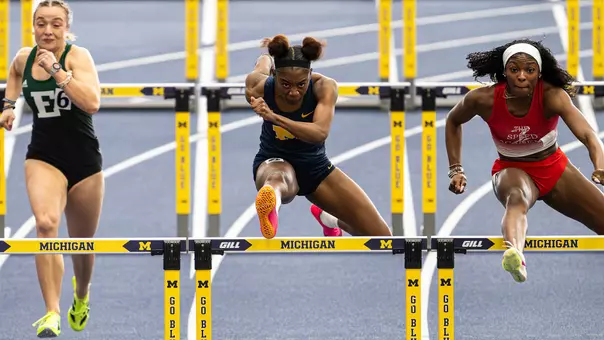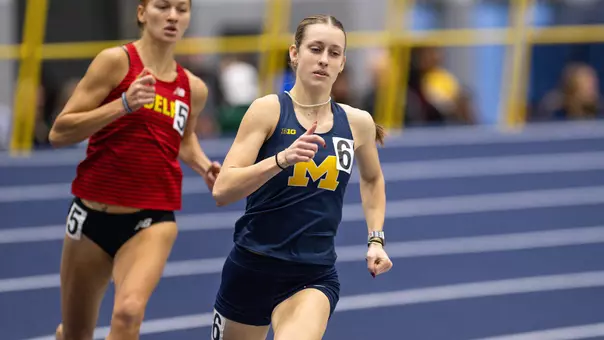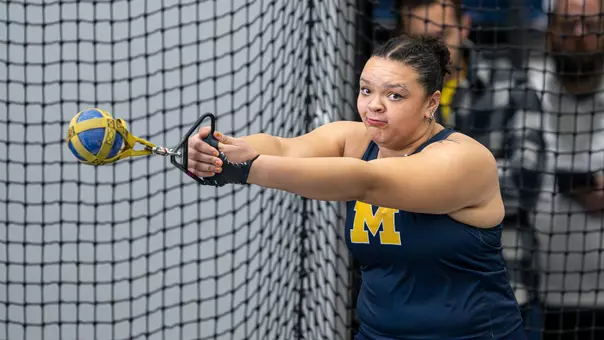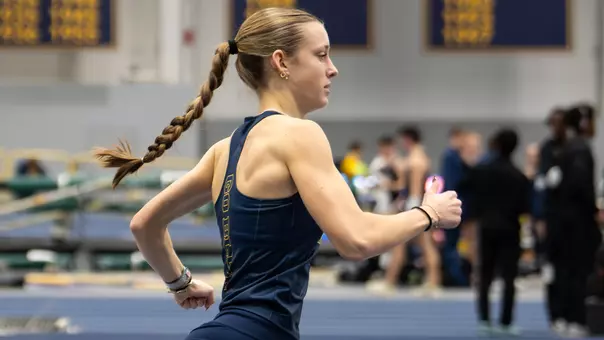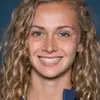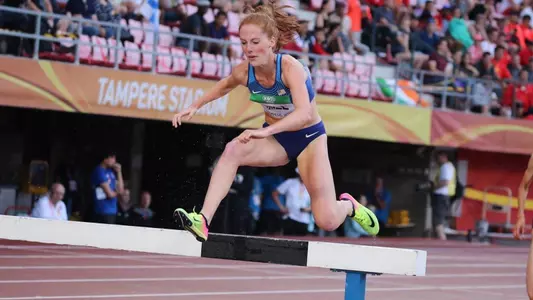
Alice Hill: An Unexpected Steeplechase Star (Part 3)
7/27/2018 2:57:00 PM | Women's Track & Field
Over the span of a single month, rising sophomore Alice Hill of the University of Michigan women's track and field team went from having never run the 3,000-meter steeplechase in June to finishing seventh at the IAAF World U20 Championships and among the fastest teenagers in the event in American history. This is the final entry of a three-part, long-form feature chronicling not just that meteoric month, but also the unique circumstances in the preceding years, months and weeks that led to her rise.
Part one of the story can be found here, and part two of the story can be found here.
More than 4,200 miles from home in Tampere, Finland, inside the confines of Tampere Stadium on the dawn of July 10, 2018, University of Michigan rising sophomore distance runner Alice Hill was -- though she could not know it at the time -- about to embark on the most fateful 83 hours of her athletic career.
While the sun was already high in the Finnish morning sky ahead of the preliminaries of the IAAF World U20 Championships steeplechase at 9:30 a.m. local EEST time, daybreak was still hours away in her Ann Arbor hometown as the clock struck 2:30 a.m. ET.
"I could feel the nerves, intense nerves," Hill said. "Especially during the season, we had so many evening races that I definitely got accustomed to that. So then having that very first morning race, I was feeling pretty stressed out."
With family -- her parents from Michigan and her aunt, uncle and grandfather from England -- having made the trip to Finland to watch her, Hill was extra nervous that she was to have had them all come out for naught if she did not advance to the final set for Friday evening.
If her vast inexperience in the event was not already enough of a disadvantage, the odds were stacked further against her based on the seeding. Of the 42 women -- all under the age of 20 -- from 27 different countries who had declared for the meet, she ranked 31st.
Only 15 women would make it through to the final: the top three finishers in each of the three heats (nine total) would earn automatic berths to Friday, while the remaining six spots would be up for grabs for the six next-fastest competitors between all three heats.
It would have been enough that all but three women in her 13-woman race -- the first of the three preliminary races -- entered with career-best times superior to Hill's 10:31.07 from Junior Nationals. Additionally, she was in the same heat as reigning World U20 champion Celliphine Chespol, who, at the time, was the second-fastest woman in the history of the world in the steeplechase.
As the gun went off and they took off in pursuit of the final, Hill was able to put all of that out of her mind.
"Honestly, I wasn't really thinking about who else is in the race," she said. "I was just trying to think about where would be a good position and just latching onto a group and trying to stay with them. I remember thinking the pace felt a lot faster, because it was."
With the pack, towed along by Chespol, going out much faster than her race at Bloomington a month prior, the effort felt much more difficult despite a temperature 20 degrees cooler than at Junior Nationals.
The hot pace at the start led to Hill -- who, like in Bloomington, recovered after a shaky opening water jump -- feeling that she faded throughout the middle of the race, but she was able to stay engaged long enough to rally back toward the end.
"I remember I followed the girl from Japan around a lot because she was the only person that was stepping on the barriers and I was watching that," she said. "Other than that, I don't really remember too much of it."

Photo courtesy of John Nepolitan
That woman from Japan was Manami Nishiyama, who would go on to finish third in the race and book an automatic berth to the final.
While Hill was not able to keep pace with Nishiyama, she did find her second wind late in the race -- but doubting all along that it would be enough.
"With a couple of laps to go, I just accepted the fact that I wasn't going to make the final," she said. "I was thinking, you know what, I'm running as hard as I can right now. And I was nowhere near top four or five, probably like 10th at that point.
"I thought, 'Oh, it's OK. You know, I gave it my best effort. This is all I can do right now. I can't go any faster.'"
And then, she did.
"I kicked in from the last water barrier to the finish and I, like, really kicked in, so afterward I thought, 'Man, I probably should have spread out a little bit more and kicked a little less, but for longer distance.'"
She had passed two women after that final water jump to move up to sixth in the heat with a big new personal record -- and, indeed, a new Michigan freshman record -- of 10:09.15. She just edged out Canada's Grace Fetherstonhaugh for that spot by .45 of a second and just missed Lisa Vogelgesang of Germany in fifth by less than a second.
Sitting in sixth place overall with two prelim races yet to come, she occupied the third of the six non-automatic qualifying spots. Given her pre-race seeding and expecting the next two heats to be faster now that they had targets to chase, Hill was less than optimistic in her chances of advancement.
She settled into the bleachers to watch the second race, which featured American teammate Gear. The freshman from Furman, who had gone 9:52 during the collegiate season, clocked 10:09.08 for third to secure her automatic berth in a sprint to the finish line by .35 of a second.
"I was so excited for her," Hill said. "I ran out to find her to give her a big hug."
Only moments later did she realize the implications of the results.
"After a couple minutes, someone mentioned to me what time Kristlin ran and that fourth place had gone the tiniest bit slower than me. Well, then that means there weren't any non-automatic qualifiers in that heat faster than me.
"I was thinking, 'I might actually do this.' I went from just 100 percent certain I wasn't making the final to thinking there's a possibility."
With just the third and final prelim heat left to go -- and needing no more than six women in the race to run faster than her 10:09.15 -- Hill was glued to the track.
"So now I have to watch this this last heat," Hill said. "I was literally on the edge of my seat, watching the clock as the people crossed the line in fourth, fifth and sixth place."

Photo courtesy of John Nepolitan
Peruth Chemutai of Uganda, Mercy Chepkurui of Kenya and Etalemahu Sintayehu of Ethiopa were all across the line in less than 10 minutes to secure the heats three automatic berths, with a group of three more runners swinging off the final turn as Sintayehu finished up -- and no one else anywhere close behind them.
Lisa Oed of Germany -- remember her? -- was the only one of those three to best Hill's time, officially giving the fourth of the six non-auto qualifying spots to perhaps the field's most unlikely finalist in Hill.
Her reaction?
"Relief," she said. "I think because of the Africa trip and how I'd sort of given that up to do this, I was thinking, 'Yes, it was worth it,' you know? I made the right choice. I was just excited. I was just thrilled."
Having qualified for the final, the reality of the situation began to set in. After running one of the hardest races of her life, she was due back at the starting line for an 8:45 p.m. local time start for Friday's race -- essentially just three-and-a-half days away.
"That's what I signed up for, but I was concerned about the resting just because I remembered after my first Indiana race that I'd been really sore for about a week," she said. "I made sure to go and see the trainers a lot and take really good care of my body.
"I knew that, obviously, my teammate Claire Borchers had run at NCAAs with only one day in between. They'd had a lot less time and she did perfectly fine and she PR'ed and did really well, So I thought, 'If she can do it, I can do it,' and I knew that all the other people in the race had the same amount of time, as well."
After 82 hours of rest, trips to the trainers and water -- "Claire said to drink lots of water," Hill recalled -- she was back on the line in Tampere.
In just her third steeplechase race, just over three months after belly-flopping into the water pit at Duke, Hill took the gun and was off in the final at the IAAF World U20 Championships.
"It did go out a lot slower than my prelim heat and I could definitely feel that," Hill said. "And I remember hearing the announcer say that. So I was thinking, 'Oh, it's kind of going slow, but you know what? That's good because I'm here and it's OK if I don't run any faster than I did last time. I'm perfectly happy with a 10:09. That's perfect.'
"I was good with this pace because, you know, in strategic races, usually, you don't PR in them. So, in racing terms, it was feeling relatively comfortable."
Running with a somewhat large pack of a half-dozen or so racers throughout much of the event, Hill began to slip late -- her second-to-last lap was her slowest of the day -- before rallying for the final push.
"And then I heard Mike in the stands saying, 'Move up one person! Move up one person.' So I did that and then I just tried to kick a little bit earlier than I did in the prelims. I was shocked when it was faster than prelims."
The rest is history.
Watching Hill clear all seven water jumps with perfect form and with a visible sense of comfort for the first time, U-M women's distance coach Mike McGuire had a slightly different reaction.
"Breaking 10 minutes surprised me," he said. "I thought she'd maybe get a bit of a PR beyond 10:09, so it was a pleasant surprise. But I wouldn't say I was shocked.
"Now she just needs to enjoy it. Her teammates had a little get-together for her when she got back. It was a big deal for her family, too. Not just her mom and dad, but also her aunt and uncle and grandpa. I think she'll tell you in a New York minute that it was as memorable experience as she's had in this sport at this point."

From left: John Hill, Deborah Hill, Alice Hill, Mike McGuire
More than a week removed from the final and back in Ann Arbor -- with a nightmarishly long travel itinerary back to the States in between that spirited them away from their Tampere hotel at 1 a.m. local time -- Hill is still taking the whole experience in.
"I think I realized I'd always watched track meets, like I watched nationals on TV, and thought, 'Oh my goodness, if I was on the start line there I would just be throwing up from anxiety,'" she said. "I really enjoy racing, but I also get anxious for it, and I think I proved to myself that I can, on the big stage, remain in control and perform well and stay relaxed. I'm not just going to fall apart as soon as the gun goes off. I think I realized that there's something primal within me that just knows what it's doing and can disregard the mental stress."
With her competitive season now complete, Hill is taking a much-needed and much-deserved break from training. When a question about how her first shakeout run after returning to America went turned into a question about whether her first shakeout run after returning to America had even happened yet, her reply was a sheepish grin and a shake of the head.
"I cooled down from my race," she finally said with a smile. "That's more than I'm sure some people do. It's not a long break until the fall, so you've got to make the most of it."
Though she and McGuire have not yet determined when that break will end -- " We're just living in the moment now," Hill said -- cross country season will soon be upon them. In what will be her first cross country season competing as an official member of a team, Hill is looking forward to continuing her growth, despite another doubling in distance from 3,000 meters to 6,000 meters.
"A lot of other people I talked to that made US team with me, were so excited for the start of cross country season," she said. "They're saying, 'Thank goodness track's over. I can't wait for cross country,' and I've never thought about it that way. Well, there must be something to be excited for."
McGuire is looking forward to adding to Hill's repertoire of talents this fall and beyond with more distance training.
"I'm really big on an athlete having a resume beyond whatever race they specialize in," he said. "We'll definitely go in that direction with Alice next year. Being a year older and a year stronger will make a big difference. I'm not saying we'll go into the 5,000 for sure, but we'll probably take a direction similar to when Anna Willard was here. A lot of 1,500s, a few 3,000s and a few 800s in there. We only ran Willard in two 5,000s her whole senior year."
The future is bright for Hill in the steeplechase, and she is part of a big new wave of talent coming through the American track system in an event that is, itself, up-and-coming. After all, Hill -- born in 1999 -- was already 2 years old when it was first contested at NCAAs and age 9 when it was introduced at the 2008 Olympics.
She is not just the future of Michigan steeplechasing, but -- along with Gear and the other four women who have already broken 10 minutes as teenagers and the many others she, in part, will inspire to do so afterward -- part of the future of American steeplechasing.
"Yeah, I was kind of thinking about that because the women's steeple just in general as a race is pretty new," she said. "So it's really, not underdeveloped, but you know, there's just not as much history behind it. It's kind of cool to do something that's new and keep pushing it forward."

